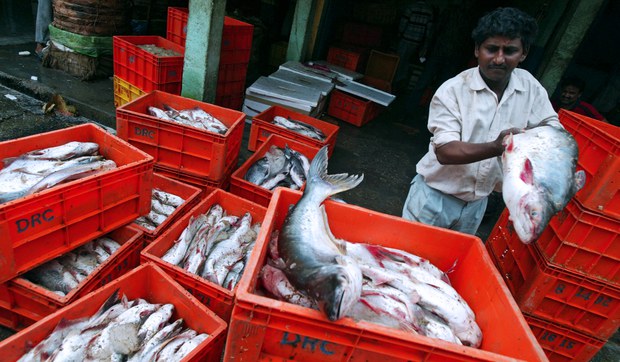India: Illegal Fishing Off West Bengal Causing Fish Scarcity
2016.02.12
Updated at 1:00 p.m. ET on 2016-02-16
Illegal use of environmentally destructive equipment and corruption are combining to rob India’s eastern coastline of its marine life, according to a top fisheries watchdog.
“Foreign fishing trawlers, mainly from Bangladesh and Taiwan, are illegally entering India’s territorial waters in the Bay of Bengal. Some trawlers are from Thailand, too,” Pranab Kumar Kar, vice president of the Federation of Indian Fisheries Industries (FIFI), told BenarNews.
“These vessels are equipped with modern bottom trawls, which can touch the bottom of the sea and capture huge volumes of fish,” Kar said.
Kar added that Indian fishermen were also frequently falling prey to piracy.
“Some foreign fishing trawlers often forcibly take away a substantive portion of Indian fishermen’s catch,” Kar said, adding that refusing to sell to these fish to pirates is “not an option as they are well known for being notoriously dangerous.”
At a news conference in Kolkata this week, FIFI warned that if exploitation of resources in the Bay of Bengal went unchecked, it would lead to a major shortage of fish in the Indian market.
Bottom trawling, also referred to as “dragging,” is a type of fishing technique in which the trawl (the fishing net) reaches the seabed, but conservationists criticize it because the netting can damage the seabed.
‘Baseless’
A maritime official told BenarNews on condition of anonymity that foreign fishing boats illegally entered Indian territorial waters by bribing Coast Guard officials.
Calls to the Indian Coast Guard seeking comment for this story were not immediately answered. But in a subsequent statement, the agency strenuously rejected the claim.
“Your comment that fishing boats illegally enter territorial waters by bribing Coast Guard officials is baseless and unacceptable,” Deputy Commandant Avinandan Mitra, a spokesman for the Coast Guard North East Region, said in the statement.
Mitra also dismissed the notion that the Coast Guard was allowing “unchecked illegal bottom trawling” by foreign boats in the Bay of Bengal.
“No such activity happens in the Indian territorial water. When some trawlers illegally enter Indian water, they are immediately arrested,” Mitra told BenarNews by phone.
According to a 2006 U.N. report, 95 percent of the damage to seamount ecosystems worldwide is due to the practice of bottom trawling. The equipment is also known as push nets.
Enakshi Sinha Roy, a Kolkata-based environmentalist, said that several countries had imposed a complete ban or severe restrictions on bottom trawling.
Thailand is one of those countries.
Last year, the Thai government formally banned the use of push nets on fishing boats after the European Union warned that Thailand could face an EU ban on its seafood products, unless it implemented measures to stamp out illegal, unregulated and unreported fishing practices (IUU).
‘Foreign boats are much bigger’
Nirmal Maity, a fisherman from Jeliakhali, which is situated amid the forests of Sundarbans, said piracy was rampant in the Bay of Bengal.
“When the pirates – they are mostly from Bangladesh – ask you to stop your boat, you have to. Or else, you are unnecessarily endangering your life,” Maity told BenarNews.
“Earlier, they used to kidnap fishermen for ransom. But nowadays, they simply make off with the catch,” he said.
Maity said massive foreign trawlers that illegally enter the country’s territorial waters were a “big problem for Indian fishermen” as they were significantly reducing the amount of fish.
“Foreign boats are much bigger and powerful than ours. With our trawlers, we can’t even go near them. Whenever these foreign trawlers are around, the volume of catch reduces substantively,” he said.
A few years ago, a band of pirates kidnapped some fishermen from Sandeshkhali, West Bengal, at gunpoint but local fisherman Sundar Das said he somehow managed to escape.
“Fishing is becoming increasingly risky as well as unproductive in the Bay of Bengal. Pirates are ruthless. Small-time fishermen like me can barely make ends meet now,” Das told BenarNews.
Biswajit Mandal, a fish retailer in Kolkata, said illegal fishing techniques off the coast of West Bengal were bound to result in a drop in fish supply in the state.
“Once the supply of seawater fish dries up, the price of the freshwater variety, which Bengalis prefer to sea fish, will soar,” Mandal told BenarNews.
“We are already witnessing a drop in the supply of seawater fish. And if the problem of illegal fishing in the Bay of Bengal continues, it is just a matter of time before the market will see a major scarcity of fish,” he said.
The story has been updated with comments from Coast Guard official Avinandan Mitra.








